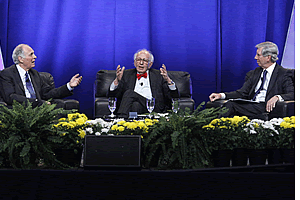Alda, Kandel, Lieberman Discuss Communicating Science
 When scientists explain their work in ways that “regular folks” use to express themselves— When scientists explain their work in ways that “regular folks” use to express themselves—
through storytelling, humor, and emotion—people will listen, learn, and be changed.
That was the consensus that emerged from a remarkable hour-long “Dialogue on Science, Psychiatry, and the Media” among APA President Jeffrey Lieberman, M.D., Nobel Prize Award-winning psychiatrist Eric Kandel, M.D., and Emmy Award-winning actor Alan Alda.
In a lively, laughter-filled dialogue, the three participants kept a packed-hall audience at the Opening Session of APA’s 2014 annual meeting at rapt attention. Lieberman prompted the conversation with questions, but it moved naturally, and seamlessly, across a range of topics: the value (or lack therof) that society places on science, scientific discovery, and scientists; the history of Kandel’s groundbreaking research on memory and the neurobiology of mental illness; Alda’s lifelong consuming interest in science and scientists, as well as his personal and family experience with mental illness; the history and persistence of stigma against psychiatry and mental illness; and the ways that scientists can communicate and express extraordinarily sophisticated concepts to laypersons.
Kandel is the only American psychiatrist to have received the Nobel Prize, which he did in 2000 for his discoveries concerning the cell and molecular mechanisms of learning and memory. He has been a frequent lecturer at APA annual meetings on topics such as how to simulate symptoms of mental illness in laboratory animals for the purposes of research and how neuroscience can inform the insights of psychoanalysis.
Born in Vienna, he and his family left Austria when Hitler came to power. During Sunday’s dialogue, he described how he first entered the field of intellectual history in an attempt to understand human motivation, then later (at the behest of friend and psychoanalyst Ernst Kris) became a psychoanalyst. But Kandel was interested in a more empirical understanding of the human mind and began to explore a territory that was largely unexplored—neuroanatomy, neurobiology, and genetics of learning and memory.
Kandel said scientists do not do their work for recognition. “I don’t think scientists are out to get attention for themselves. It’s the science that gets the attention,” he said. “Take care of your science, and your science will take care of you. . . . That’s really a philosophy I have tried to adopt. I think the problem is trying to make progress in understanding the brain. The rest will take care of itself.”
He gave a vivid description of the joy and pleasure he has derived from scientific discovery. “I found to my amazement that doing science is so different from reading books about it. Doing experiments is so fantastically interesting. You work with your own hands; there is a sensual pleasure involved; you discuss your findings with other people.”
Alda is a seven-time Emmy-Award winner who played Hawkeye Pierce in the classic television series “M*A*S*H*” and appeared in continuing roles on “ER,” “The West Wing,” and “30 Rock.” He hosted the award-winning PBS series “Scientific American Frontiers” for 11 seasons, for which he interviewed hundreds of scientists from around the world. In 2010 he hosted a science series called “The Human Spark” and in 2013 hosted “Brains on Trial,” both on PBS. He is a visiting professor at the Alan Alda Center for Communicating Science at Stony Brook University, where he helps develop innovative programs that enable scientists to communicate more effectively with the public.
“I was always curious and did experiments as a kid,” Alda said. “In my early 20s, I started reading about science because it was so fascinating, a wonderful detective story. I was asked to host this science program [on PBS], and I said was only interested if I could really talk to the scientists. . . .
In the course of [working on the series], I realized we were developing a new way to communicate science, which is to do what we are doing tonight—by having a real conversation. Not one where you ask questions you already know the answers to, but where you are willing to be changed by the answer, where you learn something that contradicts what you thought you knew. . . . By being there and naively asking questions, I brought out the real `them’ in the scientists.”
Alda expressed what emerged as a theme of the dialogue. Science, he said, becomes accessible when scientists “find a way to communicate that includes storytelling and emotion, the things that ordinary people are accustomed to taking part in when they exchange information. . . . The more scientists can express themselves in a personal way, and the more people who are in treatment do that, we are making common, simple humanity available to everyone.”
|
|
|
|
|






 When scientists explain their work in ways that “regular folks” use to express themselves—
When scientists explain their work in ways that “regular folks” use to express themselves—